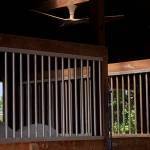Inside or Out: Exploring Standard of Care for Horse Housing

In many countries, owners keep their horses outdoors for at least part of every day. In other parts of the world, however, horses are commonly maintained indoors, a management scenario associated with social isolation.
A survey of 76 owners on 60 farms in Canada was conducted to collect information on the living conditions of their horses and their attitudes toward those conditions.* The survey results represented 211 horses. In addition to exploring welfare based on physical health, mental well-being, and natural living state, owners were queried about the “standard of care,” defined as the quality, appropriateness, or “humaneness” of care provided to horses, highlighting the “human-animal interaction dimension of animal welfare.”
Inside or Out?
In Prince Edward Island, Canada, 79% of the horses were housed full-time outdoors in groups, and an additional 15% of horses were indoors part-time but outdoors in groups for the remaining part of the day.
Over 92% of owners agreed that a horse’s physical health, mental well-being, and ability to live a natural life were better when housed outdoors rather than indoors. Yet, only 69% agree that the standard of care was better when housed outdoors. More specifically, owners who housed their horses indoors part-time indicated the standard of care provided to horses was better when housed indoors.
Owners also agreed that the physical health, mental well-being, and ability to live a natural life were better when housed in groups rather than individually. Owners who housed their horses individually believed the physical health of their horses was better than horses in groups.
Reasons for Housing Selection
When survey participants were asked why they chose indoor or outdoor housing, common answers were tradition (“always the way it’s been”), less work for the caretaker, and affordability. Owners also considered air quality, freedom to express natural behavior, and the need to move freely for health reasons such as stocking up, arthritis, or lameness.
In contrast, concerns with outdoor housing included conflict among horses maintained in groups, environmental challenges, shelter availability, and feeding groups of horses with obvious pecking orders or dominant horses. Owners were also concerned about insect problems and overconsumption of grass when housed outdoors.
Survey Results Analysis
“Owners agreed that the welfare of horses is better when maintained outdoors in groups; however, they were less likely to agree that the standard of care—the human-horse interaction—was improved when housed outdoors,” Kathleen Crandell, Ph.D., a Kentucky Equine Research nutritionist, conveyed.
Reasons for this disparity between welfare and standard of care were not clearly identified, but the researchers suggested that standard of care is a more complex issue than welfare. The researchers also questioned whether owners who kept their horses outdoors felt they were sacrificing standard of care to enhance welfare.
“Owners may believe there are tradeoffs between their horse’s well-being and their ability to provide quality care for their horses,” concluded the research team.
Addressing Grazing Concerns
As mentioned by the surveyed owners, health concerns associated with outdoor housing included excessive grazing.
“Some horses have little self-control when there is an abundance of grass available and may overconsume, resulting in excessive caloric intake and weight gain. For individuals with a predisposition to metabolic disease, this can be detrimental to their health and ultimately lead to devastating diseases such as laminitis,” explained Crandell.
For horses at risk of metabolic disease, the advantages of outdoor housing would be at the expense of quality of care. This population may therefore benefit from more time indoors and less outdoors. One compromise would be the use of a grazing muzzle, which allows for more time outdoors but limits the amount of pasture the horse can consume.
When metabolic horses have limited pasture intake and rely on forage, likely soaked hay, balance the diet with a low-intake ration balancer or vitamin and mineral supplement.
*Ross, M., K. Proudfoot, K. Merkies, I. Elsohaby, M. Mills, K. Macmillan, S. McKenna, and C. Ritter. 2023. Horse housing on Prince Edward Island, Canada: Attitudes and experiences related to keeping horses outdoors and in groups. Animals (Basel) 13(2):275.








